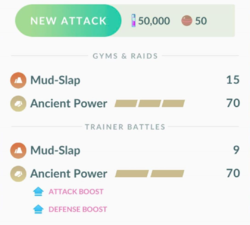Energy (GO)
Energy is a mechanic in Pokémon GO used by Pokémon to cast Charged Attacks.
Mechanics
All Pokémon can store a maximum of 100 energy in battle. Casting a Fast Attack adds energy, and casting a Charged Attack expends energy. In Gym and Raid Battles, 0.5 energy is also gained for every HP that is lost. When a Pokémon has stored enough energy to cast a Charged Attack, the Charged Attack's button will illuminate.
Every Charged Attack has an associated energy cost that the player can see as an energy bar on a Pokémon's summary screen and in battle for Gyms and Raids. The energy bar is broken up into equally-sized segments to show how many of a Charged Attack can be cast from a full energy bar. Since February 1, 2019, energy costs for Trainer Battles are also displayed as bars on the summary screen, but energy costs can vary between moves with identical energy bars.
For all energy costs of Charged Attacks and energy gains from Fast Attacks, see the list of moves in Pokémon GO.
The following table shows the numeric energy cost associated with each energy bar.
| Energy bar | Energy costs | |
|---|---|---|
| Gyms & Raids | Trainer Battles | |
| 0 | ||
| 33 | ||
| 50 | ≤50 | |
| 100 | >50 | |
At the start of a battle, all Pokémon will initially have 0 energy. In Gyms and Raids, if a Pokémon is switched out, its energy will be reset to 0. However, in Trainer Battles, Pokémon will retain their current energy if switched. In a Trainer Battle, if a Pokémon's Charged Attack costs less than 100 energy, it may still continue to rack up energy after its meter is fully charged. Hence, a Pokémon may possibly see its energy meter already partially filled immediately after casting a Charged Attack.
In both battle modes, Pokémon that know multiple Charged Attacks still have one energy supply, despite each attack having its own meter. Casting either Charged Attack would thus expend energy from both meters.

|
This game mechanic article is part of Project Games, a Bulbapedia project that aims to write comprehensive articles on the Pokémon games. |
